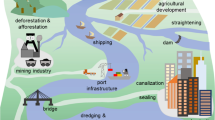
Overview
- Anthropogenic interventions on the evolution of fluvial systems from the tropical regions
- Includes global case studies to showcase the problems of the fluvial systems
- Explains how could geo-ecological and geospatial models be applied to solve the problems of the fluvial systems
Access this book
Tax calculation will be finalised at checkout
Other ways to access
About this book
This book addresses the various factors affecting fluvial systems, the processes governing them, system responses arising from human-nature interventions, and geospatial and geo-ecological modeling to understand system behaviour better and restore degraded ecosystems around the globe. Thanks to their hydrological and agro-ecological advantages, humans have settled along riverbanks since the dawn of civilization. Thus, the ancient "ecumene" (settlements) were located near major rivers worldwide. This legacy of river-based civilizations continues to this day in many forms. However, in the course of the 'Anthropocene' era, countless fluvial systems have been altered by human interventions in the form of large-scale dams and barrages, changes in land use and land cover, road-stream crossings, mining of sand and gravel, mushrooming of brickfield, expansion of modern agriculture, industrial growth, and urbanization. Thus, the present-day development pattern threatens fluvial systems,especially riverine morphology and ecosystems. In brief, human-induced morphological changes, water pollution, eutrophication, and related damages to aquatic organisms are the major threats to fluvial systems. Thus, maintaining the 'environmental flow' of the world's major rivers to preserve the proper functioning of riverine ecosystems and promote sustainable development is a global challenge.
Similar content being viewed by others
Keywords
Table of contents (25 chapters)
-
Front Matter
Editors and Affiliations
About the editors
Dr Aznarul Islam is keen on pursuing research in the fields of Fluvial Geomorphology, Hydrology and Hazard management. He holds M.Sc. degree in Geography from Kalyani University, West Bengal, and M.Phil. and Ph.D. in Geography from the University of Burdwan, West Bengal. He is currently engaged as an Assistant Professor in the Department of Geography, Aliah University, Kolkata. Previously, he served as an Assistant Professor in Geography under West Bengal Education Service (WBES). To date, he has successfully supervised one Ph.D. thesis and more than 30 dissertations at the Master's level. He has also completed one major research project funded by the ICSSR, Government of India. He has published 5 books (Springer-03, CRC Press-01, and other) and more than 60 research papers in peer-reviewed journals, conference proceedings, and edited volumes.
Smt. Prakriti Das has been awarded M.A in Geography from Jawaharlal Nehru University, New Delhi, and has done her M.Phil.in Planning and Development from Indian Institute of Technology, Bombay. Currently, she is working as an Assistant Professor in the Department of Geography in Victoria Institution (College) in Kolkata. To date, she has published 3 research papers in peer-reviewed journals and presented paper in 2 UGC-sponsored National seminars. She has also contributed as one of the editors in publishing a renowned book.
Dr Sandipan Ghosh holds post-graduate degrees of M.Sc., M.Phil., and Ph.D. from The University of Burdwan, West Bengal, India. He has published five books and more than 40 international and national research articles in various geography and geosciences journals. His principal research field includes Fluvial Geomorphology, Tectonic Geomorphology, Regolith Geology, and Quaternary Geomorphology. Currently, he is working as an Assistant Professor in the Department of Geography, Chandrapur College (Purba Barddhaman, West Bengal, India).
Dr Abarna Mukhopadhyay obtained her Ph.D. degree in Geography from Burdwan University specializing in Advanced Geomorphology. At present, she is working as an Associate Professor in the Department of Geography, Ranaghat College under Kalyani University. To date, she has successfully completed one research project funded by UGC, India. She has published 7 research papers in different peer-reviewed journals. She has contributed a chapter in a renowned book and also edited 3 books related to various aspects of Geography.
Dr Ayan Das Gupta has diverse interests in Urban Geography, Cartography, Geomorphology, Remote Sensing & GIS, Regional Planning, and Geographical Thoughts. He has been awarded M.Sc. degree and Ph.D. from University of Calcutta in the year 2006 and 2014, respectively. He is currently working as Assistant Professor in Chandernagore College in Hooghly. He has successfully completed one UGC Minor Research Project and is presently associated with a Major Research Project funded byWBDHESTBT. He has published 3 books and 14 research papers in peer-reviewed journals, conference proceedings, and edited volumes. He has presented more than 50 papers in different national and international seminars.
Dr Arun Kumar Singh is specialized as an Ecologist with M.A degree (Geography) in 1971 from the University of Ranchi and Ph.D. from University of Burdwan in the year 1978 and joined Anthropological Survey of India in 1977 as a Human Ecologist after a brief stint at Indian Institute of Management, Kolkata, and National Atlas and Thematic Mapping Organization. He retired from Anthropological Survey of India in 2007 as Senior Ecologist. He has 6 books to his credit and has published nearly 50 articles in reputed Geographical journals. He is the Editor of geographical journal "Practising Geographers".
Bibliographic Information
Book Title: Fluvial Systems in the Anthropocene
Book Subtitle: Process, Response and Modelling
Editors: Aznarul Islam, Prakriti Das, Sandipan Ghosh, Abarna Mukhopadhyay, Ayan Das Gupta, Arun Kumar Singh
DOI: https://doi.org/10.1007/978-3-031-11181-5
Publisher: Springer Cham
eBook Packages: Earth and Environmental Science, Earth and Environmental Science (R0)
Copyright Information: The Editor(s) (if applicable) and The Author(s), under exclusive license to Springer Nature Switzerland AG 2022
Hardcover ISBN: 978-3-031-11180-8Published: 06 November 2022
Softcover ISBN: 978-3-031-11183-9Published: 07 November 2023
eBook ISBN: 978-3-031-11181-5Published: 05 November 2022
Edition Number: 1
Number of Pages: XVIII, 487
Number of Illustrations: 10 b/w illustrations, 150 illustrations in colour
Topics: Water, general, Physical Geography, Sedimentology, Ecology



